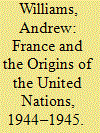|
|
|
Sort Order |
|
|
|
Items / Page
|
|
|
|
|
|
|
| Srl | Item |
| 1 |
ID:
154109


|
|
|
|
|
| Summary/Abstract |
Drawing on a diverse array of archival and secondary sources, this analysis examines the role of Thomas Pelham Holles, First Duke of Newcastle, against the background of the famous Reversal of Alliances that ushered in the Seven Years War. Contrary to historical tradition, Newcastle showed an admirable grasp of finance, politics, and diplomacy—a precondition of the political stability that facilitated Britain’s successful pursuit of military operations during the war. Unlike most noble contemporaries, with a sound understanding of European/colonial developments, Newcastle was capable of pursuing coherent policies with intelligence and resolution. In a political system that relied heavily on social connexions and diplomatic ritual, Newcastle performed as well as any minister could hope; in an extremely dynamic international environment, contending with dubious allies, implacable enemies, and the vicissitudes of military fortune, he conceived, negotiated, and executed policies that raised necessary funds and sent British forces around the globe on an unprecedented scale. This should be remembered when assessing his historical reputation.
|
|
|
|
|
|
|
|
|
|
|
|
|
|
|
|
| 2 |
ID:
154111


|
|
|
|
|
| Summary/Abstract |
During their long exile during 1940–1944, various components of the “Free French” were largely kept out of the “Post-War Planning” process that took place in the American State Department. They perceived this absence as a major, and often deliberate, humiliation that made the circumstances of their exile all the more exasperating. Charles de Gaulle was seen by the “Anglo–Saxon” Allies as a figure of dubious worth and usefulness, and Washington’s general tone was to dismiss the exiles as the “so-called Free French.” They were admitted to the decision-making process only slowly and grudgingly, and not until after many of the key decisions about organising the United Nations had been taken. This article shows how that exclusion affected the French leadership, how they reacted, and suggests some lasting results. It also assesses to what extent France had a coherent contribution to the formation of a global international organisation during 1943–1944, and what factors inhibited France properly articulating that contribution.
|
|
|
|
|
|
|
|
|
|
|
|
|
|
|
|
| 3 |
ID:
154115


|
|
|
|
|
| Summary/Abstract |
At 10:30 in the morning on 28 June 1992, a Dauphin helicopter landed at Sarajevo airport carrying a precious cargo: the French president, François Mitterrand. Since the beginning of the Bosnian War, Bosnian Serb forces had controlled the airport and restricted the delivery of humanitarian aid to the city’s destitute population, which formed an important cornerstone of their siege strategy. In reaching the airport, the president secured its re-opening and, with it, the commencement of one of the longest humanitarian airlifts in history. However, Mitterrand’s visit also had implications and significance beyond the Bosnian capital. The visit secured humanitarian intervention through the United Nations as the international community’s modus operandi for conflict resolution in Bosnia-Hercegovina. Through its permanent membership of the United Nations Security Council and enthusiastic engagement with humanitarian intervention, France would shape the intervention in Bosnia-Hercegovina and thus continue to justify its position amongst the world’s Great Powers.
|
|
|
|
|
|
|
|
|
|
|
|
|
|
|
|
| 4 |
ID:
154113


|
|
|
|
|
| Summary/Abstract |
It appeared that as 1977 dawned, the political climate in the United States might render multi-billion dollar arms sales into unstable regions a thing of the past. Jimmy Carter triumphed in the presidential election of November 1976 on a popular platform of arms control and the introduction of human rights considerations into American foreign policy. His transition from that idealistic candidate to the president who agreed to sell Iran a fleet of highly advanced AWACS aircraft, as part of a record breaking $5.7 billion arms package, is therefore outwardly confusing. Yet, when examining the entrenched policy path that Carter inherited regarding arming Iran, and the larger needs of Cold War containment, the logic of Carter’s decisions essentially to betray his own policies in this case becomes clear.
|
|
|
|
|
|
|
|
|
|
|
|
|
|
|
|
| 5 |
ID:
154114


|
|
|
|
|
| Summary/Abstract |
This analysis considers the impact of the demonstrations that occurred in Kosovo in spring 1981. They shocked Federal Yugoslavia and re-opened the Kosovo question as an issue in European and international diplomacy. They simultaneously intensified and consolidated the Albanian national movement in Kosovo, although activists held differing views as to the best solution to the problem. Another result of the demonstrations was a deterioration in Albano–Yugoslav relations over territorial and nationalist issues. The “Kosovo Spring” placed Albania in conflict with Yugoslavia, which declared a state of emergency in Kosovo on 2 April 1981 and suppressed the demonstrations by force. The events in Kosovo had the effect of redefining the whole Albanian question. The maturity of the Albanian response led international opinion to take Albania more seriously. For its part, Albania was impelled to evaluate more highly the response of Western countries to events in Kosovo and initiate a more realistic approach to the West—albeit tentatively—despite the persistence of deep ideological differences. The demonstrations of 1981 had a substantial effect on Albanian state policy regarding Kosovo.
|
|
|
|
|
|
|
|
|
|
|
|
|
|
|
|
| 6 |
ID:
154116


|
|
|
|
|
| Summary/Abstract |
Muammar Qaddafi’s decision to dismantle his Weapons of Mass Destruction programmes in December 2003 elicited an extensive debate about the role of normal versus coercive diplomacy. The normal diplomacy perspective rests on factors that cannot solve the “why know” problem, and it relies on an unsupported assumption that Qaddafi’s identity had changed. The Libyan case, however, challenges the coercive diplomacy model. Libya confronted a demand and threat to disarm, but the George W. Bush Administration issued no explicit threats, placed no time deadlines on Libyan compliance, and attached only a moderate sense of urgency to Libya’s WMD program. This study argues that the coercive diplomacy perspective needs slight modification to account for the Libyan case. The wars in Afghanistan and Iraq provided implied threats to Qaddafi’s survival. The Bush Administration then used veiled threats to threaten Qaddafi simultaneously with unacceptable damage and enable diplomats to find a peaceful solution to the crisis.
|
|
|
|
|
|
|
|
|
|
|
|
|
|
|
|
| 7 |
ID:
154112


|
|
|
|
|
| Summary/Abstract |
This analysis assesses American foreign policy toward the Ba’ath Party’s 1968 coup in Iraq. Whilst prominent American business groups expressed sympathy for the new Ba’athist regime in Baghdad, there is, as yet, no available evidence that these business groups received any official support from Washington. On the contrary, key policymakers within the Lyndon Johnson Administration had come to see the Ba’ath as a Cold War “enemy” by the late 1960s.
|
|
|
|
|
|
|
|
|
|
|
|
|
|
|
|
| 8 |
ID:
154110


|
|
|
|
|
| Summary/Abstract |
This analysis shows how Japanese legations, first established in Europe during the 1870s, were not just symbolic gestures but played a key role in the Meiji government’s quest for international recognition. The concept of resident ambassador was unfamiliar beyond the European world, so the transition from sending visiting envoys to establishing permanent missions was a pivotal stage. Here a comparative framework gauges the importance of Japan’s new strategy within the context of similar experiments by states such as the Ottoman Empire, Persia, and subsequently China and Siam. The case of Sameshima Naonobu, Japan’s first resident minister in Europe, highlights the cultural barriers the Japanese faced. Assisted by Frederick Marshall, an Englishman at the Japanese Legation in Paris, Sameshima’s research on the mysteries encoded in this particular social universe offers some insight on the nature of the diplomatic corps in Europe.
|
|
|
|
|
|
|
|
|
|
|
|
|
|
|
|
| 9 |
ID:
154117


|
|
|
|
|
| Summary/Abstract |
How has the United States used migration as part of its statecraft and foreign policy? This question is significant because migration is an important contemporary transnational policy area for the United States; and because a state’s foreign-immigration policy nexus remains an under-explored vantage point for examining diplomatic and international history. This review article answers the question and lays conceptual and empirical ground in the area by examining the historical record and extant research to show that American leaders from the country’s founding through the early twenty-first century have used migration as an instrument of statecraft by primarily attempting to reach three foreign policy objectives: pleasing, harming, and bargaining with states. For each of these categories, the analysis explicates relationships between statecraft and migration for the United States, identifies policy instruments used by American leaders to influence migration for diplomatic and foreign policy objectives, and presents historical cases of American migration policies designed for foreign policy goals. The conclusion provides the research and policy implications of its findings.
|
|
|
|
|
|
|
|
|
|
|
|
|
|
|
|
|
|
|
|
|